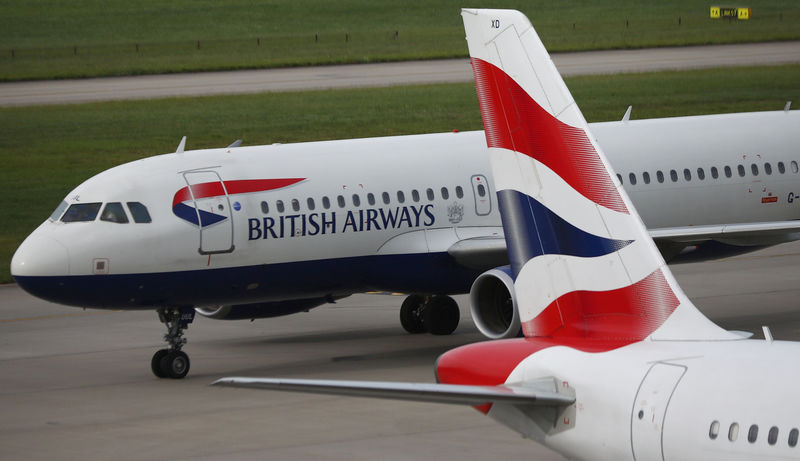By Alistair Smout and Victoria Bryan
LONDON/BERLIN (Reuters) - British Airways (L:ICAG) must turn its attention to repairing its brand after a weekend of chaos and criticism caused by a major IT outage that grounded flights from London's two main airports.
Thousands were left stranded when an IT systems failure on Saturday left the airline unable to allow passengers to check in or board flights.
The meltdown at the start of a school holiday week in Britain unleashed a wave of criticism for BA, which like other full-service airlines has been cutting costs to compete with budget carriers Ryanair (I:RYA) and easyJet (L:EZJ).
BA had already come under fire in recent months for charging passengers for sandwiches on shorter flights and cutting leg room on short-haul business to help fit in more seats per plane.
Ryanair was quick to try to capitalise, using references to comedies "Airplane" and "Little Britain" on social media to suggest passengers book with it instead.
Critics in the British media questioned BA's strategy and the way it was positioning itself in a competitive market.
"How long will passengers continue to pay through the nose if they are receiving a service the cheapest budget airline would be ashamed of," mid-market newspaper the Daily Mail wrote on Monday.
On customer review site Skytrax, BA had a score of 5/10, with many reviewers saying they feel the airline's economy class on short-haul is now no better than a budget carrier.
By comparison, low cost carriers Ryanair and easyJet score 6/10, while Lufthansa (DE:LHAG) and KLM (PA:AIRF) score 7/10.
RBC analyst Damian Brewer said that the latest BA problems could hit future revenues for parent company IAG (L:ICAG).
"This is, in our view, a very unhelpful development for BA customers - and hence IAG shareholders," he wrote in a note, adding that sister carrier Vueling also experienced operational problems during the peak summer period last year.
CHARM OFFENSIVE NEEDED
Spanish-listed shares of IAG, which also owns carriers Iberia and Aer Lingus, dropped 2.5 percent on Monday after an outage which is likely to cost tens of millions of pounds in compensation and other refunds.
Analysts said BA needed a charm offensive after being criticised for its response over the weekend.
"There needs to be an important communications exercise after this, to give assurances that the systems, back up systems and risk plan is as good as it can be," said Davy transport analyst Stephen Furlong.
"But this has happened before with other global airlines, and the stock market effect for these other airlines really wasn't big," he added.
BA CEO Alex Cruz said on Monday that he was "profusely sorry", and that the problems were due to a power surge that also knocked out its back-up systems and had nothing to do with outsourcing. The GMB union had blamed IT shortcomings on a decision to shift work to India last year.
Some wondered why IAG Chief Executive Willie Walsh, a former head of BA and better known in Britain than Cruz, had not appeared in public.
Kunal Kothari, UK All Cap equity analyst at Old Mutual Global Investors, a top-10 shareholder in IAG stock, said he did not expect lasting financial repercussions for the group.
"As long as an airline deals with outages in a sensible and customer friendly way, lasting brand damage is unlikely," he said.
"Without a full investigation I just don't think cost cutting can be blamed," he added.
IT FAILINGS
Gil Hecht, the CEO of Israel-based IT outage prevention firm Continuity Software, told Reuters that providing such incidents happened no more than once a year, people would probably carry on booking.
Other airlines have swiftly recovered after a one-off financial hit from IT glitches.
Delta (N:DAL) had to cancel 2,300 flights over a three-day period in August after a power outage grounded its flights. The incident knocked $150 million off its pretax profit for the quarter, while Southwest Airlines (N:LUV) also downgraded revenue targets last year after a computer outage forced it to cancel more than 2,000 flights.
Airlines' reservations and IT systems are often a combination of modern systems built on top of technology from the 1960s. The need to keep systems running 24/7 means it is hard to shut them down for a full overhaul.
Hecht of Continuity Software said the Delta outage had spurred interest from firms looking to improve their resilience, and that in the last two years, there has been a 500 percent increase in demand for business continuity technologies.
"It is possible for British Airways and other airlines to do a better job, but some of it is a financial decision," he said.
Speaking after the Delta incident last summer, a senior Lufthansa manager said the carrier's main operations centre in Frankfurt had continuity measures built in but that the airline also had a back-up centre at a separate, undisclosed location.
Michael Gierse, a fund manager at Lufthansa shareholder Union Investment, said all companies, not just airlines, should have a board member responsible for IT.

"It would be even better if the CEO were in charge of IT. It's so important," he told Reuters.